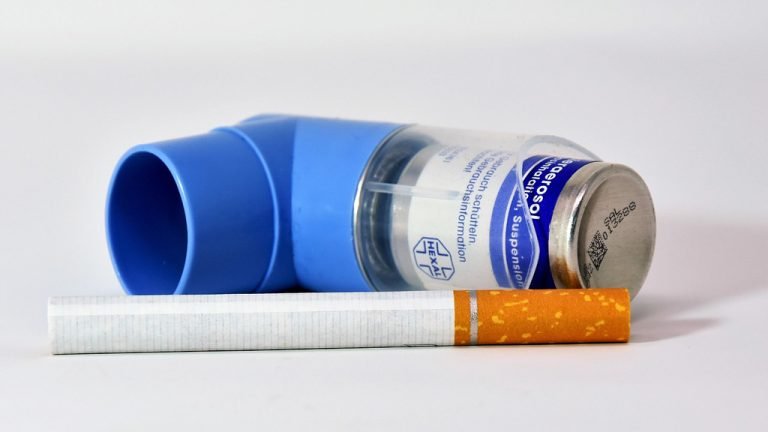Asthma has multiple causes:
- Allergic: Some people’s allergies can cause an asthma attack. Allergens include things like molds, pollens and pet dander.
- Non-allergic: Outside factors can cause asthma to flare up. Exercise, stress, illness and weather may cause a flare.
- Adult-onset: This type of asthma starts after the age of 18.
- Pediatric: Also called childhood asthma, this type of asthma often begins before the age of 5, and can occur in infants and toddlers. Children may outgrow asthma. You should make sure that you discuss it with your provider before you decide whether your child needs to have an inhaler available in case they have an asthma attack. Your child’s healthcare provider can help you understand the risks.
- Exercise-induced asthma: This type is triggered by exercise and is also called exercise-induced bronchospasm.
- Occupational asthma: This type of asthma happens primarily to people who work around irritating substances.
- Asthma-COPD overlap syndrome (ACOS): This type happens when you have both asthma and chronic obstructive pulmonary disease (COPD). Both diseases make it difficult to breathe.
Who can get asthma?
Anyone can develop asthma at any age. People with allergies or people exposed to tobacco smoke are more likely to develop asthma. This includes secondary smoke (exposure to someone else who is smoking) and thirdhand smoke (exposure to clothing or surfaces in places where some has smoked).
Few Know factors what causes asthma?
- Allergies: Having allergies can raise your risk of developing asthma.
- Environmental factors: People can develop asthma after exposure to things that irritate the airways. These substances include allergens, toxins, fumes and second- or third-hand smoke. These can be especially harmful to infants and young children whose immune systems haven’t finished developing.
- Genetics: If your family has a history of asthma or allergic diseases, you have a higher risk of developing the disease.
- Respiratory infections: Certain respiratory infections, such as respiratory syncytial virus (RSV)can damage young children’s developing lungs.
What are common asthma attack triggers?
You can have an asthma attack if you come in contact with substances that irritate you. Healthcare providers call these substances “triggers.” Knowing what triggers your asthma makes it easier to avoid asthma attacks. For some people, a trigger can bring on an attack right away. For other people, or at other times, an attack may start hours or days later. Triggers can be different for each person. But some common triggers include:
- Air pollution: Many things outside can cause an asthma attack. Air pollution includes factory emissions, car exhaust, wildfire smoke and more.
- Dust mites: You can’t see these bugs, but they are in our homes. If you have a dust allergy, this can cause an asthma attack.
- Exercise: For some people, exercising can cause an attack.
- Mold: Damp places can spawn mold, which can cause problems if you have asthma. You don’t even have to be allergic to mold to have an attack.
- Pests: Cockroaches, mice and other household pests can cause asthma attacks.
- Pets: Your pets can cause asthma attacks. If you’re allergic to pet dander (dried skin flakes), breathing in the dander can irritate your airways.
- Tobacco smoke: If you or someone in your home smokes, you have a higher risk of developing asthma. You should never smoke in enclosed places like the car or home, and the best solution is to quit smoke.
- Strong chemicals or smells. These things can trigger attacks in some people.
- Certain occupational exposures. You can be exposed to many things at your job, including cleaning products, dust from flour or wood, or other chemicals. These can all be triggers if you have asthma.






